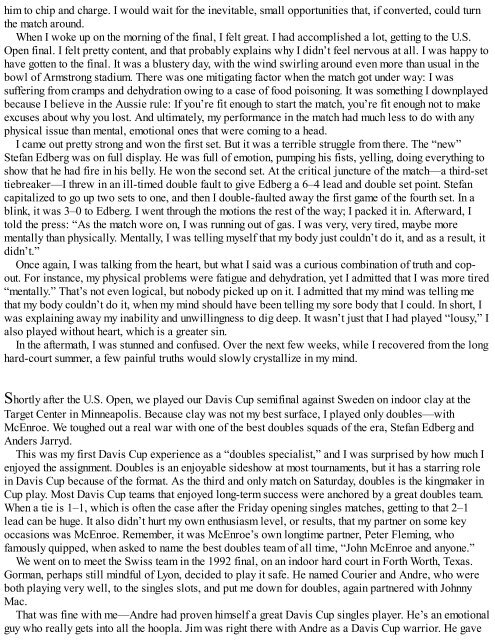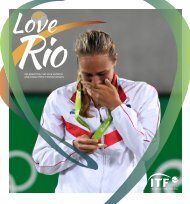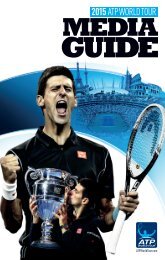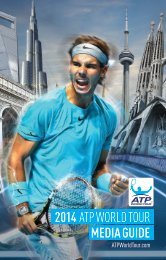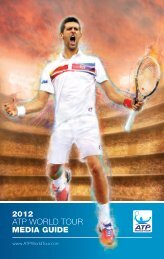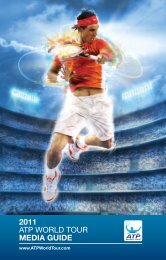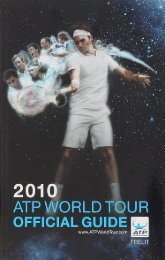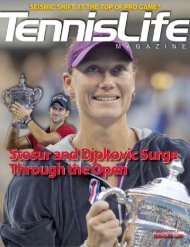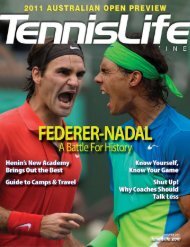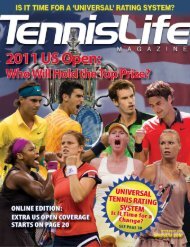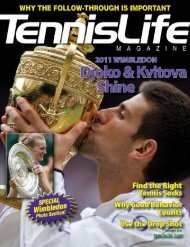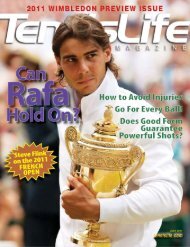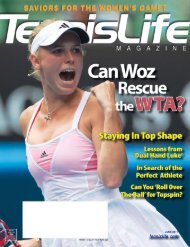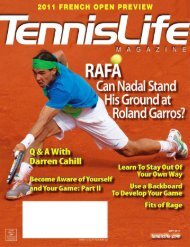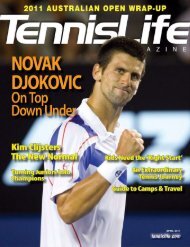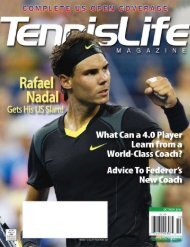A Champion's Mind - Pete Sampras
www.tennismoscow.me Insta:TENNISMOSCOW
www.tennismoscow.me Insta:TENNISMOSCOW
You also want an ePaper? Increase the reach of your titles
YUMPU automatically turns print PDFs into web optimized ePapers that Google loves.
him to chip and charge. I would wait for the inevitable, small opportunities that, if converted, could turn<br />
the match around.<br />
When I woke up on the morning of the final, I felt great. I had accomplished a lot, getting to the U.S.<br />
Open final. I felt pretty content, and that probably explains why I didn’t feel nervous at all. I was happy to<br />
have gotten to the final. It was a blustery day, with the wind swirling around even more than usual in the<br />
bowl of Armstrong stadium. There was one mitigating factor when the match got under way: I was<br />
suffering from cramps and dehydration owing to a case of food poisoning. It was something I downplayed<br />
because I believe in the Aussie rule: If you’re fit enough to start the match, you’re fit enough not to make<br />
excuses about why you lost. And ultimately, my performance in the match had much less to do with any<br />
physical issue than mental, emotional ones that were coming to a head.<br />
I came out pretty strong and won the first set. But it was a terrible struggle from there. The “new”<br />
Stefan Edberg was on full display. He was full of emotion, pumping his fists, yelling, doing everything to<br />
show that he had fire in his belly. He won the second set. At the critical juncture of the match—a third-set<br />
tiebreaker—I threw in an ill-timed double fault to give Edberg a 6–4 lead and double set point. Stefan<br />
capitalized to go up two sets to one, and then I double-faulted away the first game of the fourth set. In a<br />
blink, it was 3–0 to Edberg. I went through the motions the rest of the way; I packed it in. Afterward, I<br />
told the press: “As the match wore on, I was running out of gas. I was very, very tired, maybe more<br />
mentally than physically. Mentally, I was telling myself that my body just couldn’t do it, and as a result, it<br />
didn’t.”<br />
Once again, I was talking from the heart, but what I said was a curious combination of truth and copout.<br />
For instance, my physical problems were fatigue and dehydration, yet I admitted that I was more tired<br />
“mentally.” That’s not even logical, but nobody picked up on it. I admitted that my mind was telling me<br />
that my body couldn’t do it, when my mind should have been telling my sore body that I could. In short, I<br />
was explaining away my inability and unwillingness to dig deep. It wasn’t just that I had played “lousy,” I<br />
also played without heart, which is a greater sin.<br />
In the aftermath, I was stunned and confused. Over the next few weeks, while I recovered from the long<br />
hard-court summer, a few painful truths would slowly crystallize in my mind.<br />
Shortly after the U.S. Open, we played our Davis Cup semifinal against Sweden on indoor clay at the<br />
Target Center in Minneapolis. Because clay was not my best surface, I played only doubles—with<br />
McEnroe. We toughed out a real war with one of the best doubles squads of the era, Stefan Edberg and<br />
Anders Jarryd.<br />
This was my first Davis Cup experience as a “doubles specialist,” and I was surprised by how much I<br />
enjoyed the assignment. Doubles is an enjoyable sideshow at most tournaments, but it has a starring role<br />
in Davis Cup because of the format. As the third and only match on Saturday, doubles is the kingmaker in<br />
Cup play. Most Davis Cup teams that enjoyed long-term success were anchored by a great doubles team.<br />
When a tie is 1–1, which is often the case after the Friday opening singles matches, getting to that 2–1<br />
lead can be huge. It also didn’t hurt my own enthusiasm level, or results, that my partner on some key<br />
occasions was McEnroe. Remember, it was McEnroe’s own longtime partner, <strong>Pete</strong>r Fleming, who<br />
famously quipped, when asked to name the best doubles team of all time, “John McEnroe and anyone.”<br />
We went on to meet the Swiss team in the 1992 final, on an indoor hard court in Forth Worth, Texas.<br />
Gorman, perhaps still mindful of Lyon, decided to play it safe. He named Courier and Andre, who were<br />
both playing very well, to the singles slots, and put me down for doubles, again partnered with Johnny<br />
Mac.<br />
That was fine with me—Andre had proven himself a great Davis Cup singles player. He’s an emotional<br />
guy who really gets into all the hoopla. Jim was right there with Andre as a Davis Cup warrior. He gave


